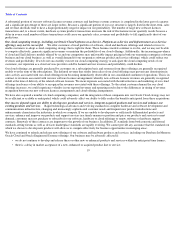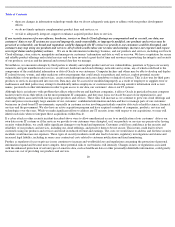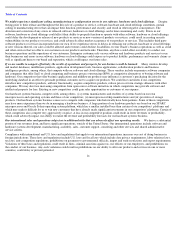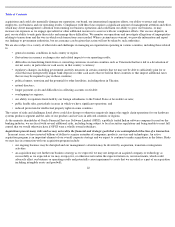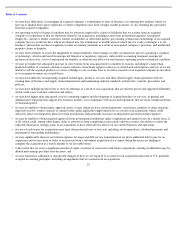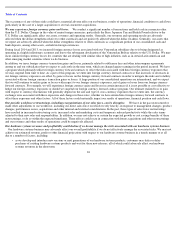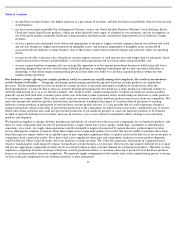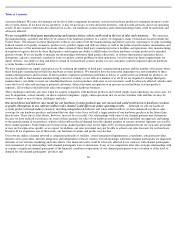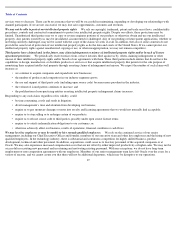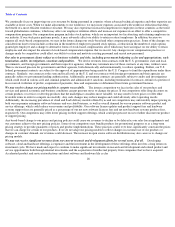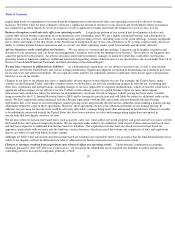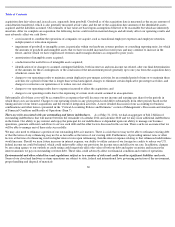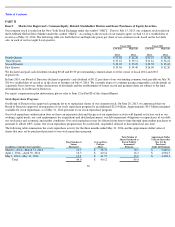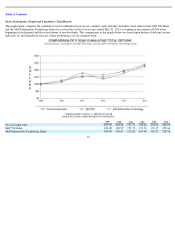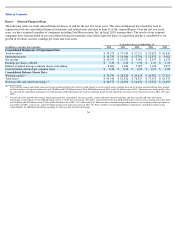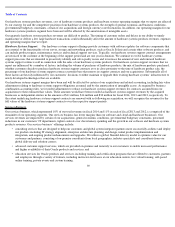Oracle 2013 Annual Report Download - page 33
Download and view the complete annual report
Please find page 33 of the 2013 Oracle annual report below. You can navigate through the pages in the report by either clicking on the pages listed below, or by using the keyword search tool below to find specific information within the annual report.
Table of Contents
require high levels of expenditures for research and development that could adversely affect our operating results if not offset by revenue
increases. We believe that we must continue to dedicate a significant amount of resources to our research and development efforts to maintain
our competitive position. However, we do not expect to receive significant revenues from these investments for several years, if at all.
Business disruptions could adversely affect our operating results.
A significant portion of our research and development activities and
certain other critical business operations are concentrated in a few geographic areas. We are a highly automated business and a disruption or
failure of our systems could cause delays in completing sales and providing services, including some of our cloud offerings. A major earthquake,
fire or other catastrophic event that results in the destruction or disruption of any of our critical business or IT systems could severely affect our
ability to conduct normal business operations and, as a result, our future operating results could be materially and adversely affected.
Adverse litigation results could affect our business.
We are subject to various legal proceedings. Litigation can be lengthy, expensive and
disruptive to our operations, and can divert our management’s attention away from the running of our business. The results of our litigation also
cannot be predicted with certainty. An adverse decision could result in monetary damages or injunctive relief that could affect our business,
operating results or financial condition. Additional information regarding certain of the lawsuits we are involved in is discussed under Note 18 of
Notes to Consolidated Financial Statements included elsewhere in this Annual Report.
We may have exposure to additional tax liabilities. As a multinational corporation, we are subject to income taxes as well as non-income
based taxes, in both the United States and various foreign jurisdictions. Significant judgment is required in determining our worldwide provision
for income taxes and other tax liabilities. We are regularly under audit by tax authorities and those authorities often do not agree with positions
taken by us on our tax returns.
Changes in tax laws or tax rulings may have a significantly adverse impact on our effective tax rate. For example, the United States, many
countries in the European Union, and other countries where we do business, are actively considering changes in relevant tax, accounting and
other laws, regulations and interpretations, including changes to tax laws applicable to corporate multinationals, which, if enacted, could have a
significant adverse impact on our effective tax rate. Further, in the ordinary course of a global business, there are many intercompany
transactions and calculations where the ultimate tax determination is uncertain. Our intercompany transfer pricing has been and is currently
being reviewed by the U.S. Internal Revenue Service (IRS) and by foreign tax jurisdictions and will likely be subject to additional audits in the
future. We have negotiated certain unilateral Advance Pricing Agreements with the IRS and certain selected bilateral Advance Pricing
Agreements that cover many of our intercompany transfer pricing issues and preclude the relevant tax authorities from making a transfer pricing
adjustment within the scope of these agreements. However, these agreements do not cover substantial elements of our transfer pricing. In
addition, our provision for income taxes could be adversely affected by earnings being lower than anticipated in jurisdictions which we consider
to be indefinitely reinvested outside the United States that have lower statutory tax rates and earnings being higher than anticipated in
jurisdictions that have higher statutory tax rates.
We are also subject to non-income based taxes, such as payroll, sales, use, value-
added, net worth, property and goods and services taxes, in both
the United States and various foreign jurisdictions. We are regularly under audit by tax authorities with respect to these non-income based taxes
and may have exposure to additional non-income based tax liabilities. Our acquisition activities have increased our non-income based tax
exposures, particularly with our entry into the hardware systems business, which increased the volume and complexity of laws and regulations
that we are subject to and with which we must comply.
Although we believe that our income and non-
income based tax estimates are reasonable, there is no assurance that the final determination of tax
audits or tax disputes will not be different from what is reflected in our historical income tax provisions and accruals.
Charges to earnings resulting from acquisitions may adversely affect our operating results. Under business combination accounting
standards pursuant to ASC 805, Business Combinations , we recognize the identifiable assets acquired, the liabilities assumed and any non-
controlling interests in acquired companies generally at their
29


